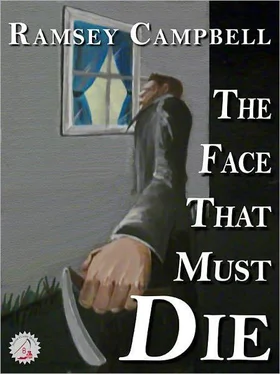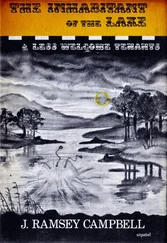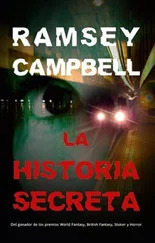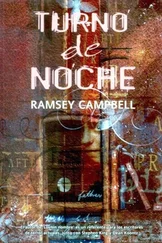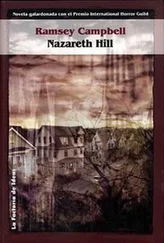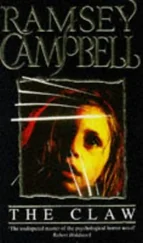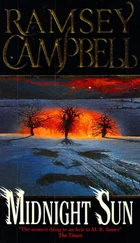Ramsey Campbell - The Face That Must Die
Здесь есть возможность читать онлайн «Ramsey Campbell - The Face That Must Die» весь текст электронной книги совершенно бесплатно (целиком полную версию без сокращений). В некоторых случаях можно слушать аудио, скачать через торрент в формате fb2 и присутствует краткое содержание. Жанр: Триллер, на английском языке. Описание произведения, (предисловие) а так же отзывы посетителей доступны на портале библиотеки ЛибКат.
- Название:The Face That Must Die
- Автор:
- Жанр:
- Год:неизвестен
- ISBN:нет данных
- Рейтинг книги:4 / 5. Голосов: 1
-
Избранное:Добавить в избранное
- Отзывы:
-
Ваша оценка:
- 80
- 1
- 2
- 3
- 4
- 5
The Face That Must Die: краткое содержание, описание и аннотация
Предлагаем к чтению аннотацию, описание, краткое содержание или предисловие (зависит от того, что написал сам автор книги «The Face That Must Die»). Если вы не нашли необходимую информацию о книге — напишите в комментариях, мы постараемся отыскать её.
The Face That Must Die — читать онлайн бесплатно полную книгу (весь текст) целиком
Ниже представлен текст книги, разбитый по страницам. Система сохранения места последней прочитанной страницы, позволяет с удобством читать онлайн бесплатно книгу «The Face That Must Die», без необходимости каждый раз заново искать на чём Вы остановились. Поставьте закладку, и сможете в любой момент перейти на страницу, на которой закончили чтение.
Интервал:
Закладка:
Horridge blundered along the row. It wasn’t empty, after all. The children were reluctant to let him through. Fear ached in his stomach like gas, and filled his skull; his head seemed weightless, hardly part of him. The man couldn’t harm him here, surely – but he could follow him home and find out where he lived.
He fell into the aisle. The wall slapped his palm, bruising it. The audience roared with laughter. He ran to the double doors. Another airlock. He fled through the dim purple box, and out. Beyond the double doors were double doors. He wrested them open. But the street was not beyond them: only laughter.
It was the cinema in which he’d first sat. The tilted screen was full of Peter Sellers’ face, Orientally disguised. Was everything in league with the killer to confuse him? An usherette advanced on him from the dark. The buzz of the indirect lighting seemed to crawl over his skin.
A bright arrow caught his eye: EXIT. He ran, dodging aside from a pillar, and grabbed the door to which he thought the arrow was pointing. Only the stare of the woman who emerged told him how mistaken he was.
As he fell back he heard the rain. Though his skin felt like moist unstable jelly, he forced himself to listen. Yes, it was rain, splashing faintly beyond a pair of doors beside him; it must be rain, it must. He banged the doors wide, glancing fearfully to see that there was nobody in sight behind him. He stumbled down a short stone passage, to a pair of doors locked with metal bars. He wrenched at the bars. He wrenched again, and the doors crashed open, freeing him.
Rain washed his face and stung his blinded eyes. His panic clung to him; he couldn’t tell where he’d emerged. At last he saw how the side street led to the main road. He fled towards the lights. At the corner he blundered against a newspaper-stall – a carton that bore a pile of newspapers scattered with coins. The papers spilled, overlapping: HAVE YOU SEEN THIS MAN? MAN? MAN? Everything seemed to be addressing him.
He limped towards Lime Street, past the front of the cinema. There was no sign of the man in the bright foyer. Wind and rain swept across St George’s Plateau, past the stone lions and the diggings for the underground railway. He hurried downhill to the previous bus stop, and stood in shadow to be less conspicuous. The ache in his leg began to count the steps he’d taken today.
His panic was subsiding, or transforming. The nervousness that crept over his skin was more purposeful; it nagged him to act. He wished furiously that he hadn’t fled. He should have called the manager, the police.
He didn’t believe in coincidences. The more unlikely they seemed, the more that convinced him they were meant to happen. Shadows dripped around him; his sweat turned chill. His fingers worked in his pockets, frustrated. He had seen the killer three times now, in as many days. That was no coincidence. But what was he meant to do?
Chapter IV
“ Edge Hill Public Library,” Cathy said.
The telephone held its breath. For years she’d longed for the chance to say “If this is an obscene phone call I’ll just go and get a chair.” But no doubt it was one of the boys they’d chased out for playing football with a book. “Edge Hill Library,” she announced again.
“ Is Mrs Cathy Gardner there, please?”
Was her mother mocking her telephone voice, or had she genuinely failed to recognise her? “It’s me,” Cathy said.
“ Oh, hello. Happy New Year.” Perhaps her mother had been holding off the conversation while she thought of what to say. “Did you survive Christmas?”
“ Yes, thanks. Just about,” Cathy joked. “Happy New Year.”
“ Did he come?”
“ Yes, on Boxing Day.”
“ What did he say about me this time?”
“ Oh, he just wanted to know how you were.” In fact Cathy’s father had asked whether she’d returned to Lewis, who had left her for good shortly after the separation. He’d known the answer, but had wanted the reassurance, the secret delight.
“ Did he. That was good of him.” Her breathing became curt. Then she dismissed the subject, and said “Have you thought any more about buying a house?”
“ Yes, a bit.” But she didn’t think Peter had.
Did her mother sense that turn of her thoughts? “How are Peter’s studies?
“ All right. He’ll have more time when he’s left the libraries.”
Her mother’s brief dissatisfied sound seemed unhappy – because Cathy wasn’t being open? “I’ve got to go now. There are people waiting at the counter,” Cathy said.
“ Have you? Well, if you must go, you must.” All of a sudden, as though she had been hoping they could talk longer, she said plaintively “I hope you’ll both come to see me soon.”
“ We will, mummy. Don’t worry.” The wire hissed emptily. She was about to repeat her promise when a click left her alone with the long anonymous whir of the dial tone.
As she hurried to serve the queue, she felt dispirited. Was she due for a fit of depression? She felt heavy as a Christmas pudding. Feeling fat was often the first sign. Although she knew that it must end eventually, depression robbed her of all sense of time.
“ Got any love books?” women were pleading. She showed them where the romances were kept separate. “Where’s the football?” a boy demanded. He wasn’t asking for his ball back; she pointed to the shelves where football books were filed, at 796.334 – you learned that classification quickly in Liverpool libraries. An old lady carrying a poodle like a tartan bag returned an overdue book; since nobody was looking, Cathy didn’t charge her a fine. The man who always said “Voters’ list, please” as if instructing a servant tried to look as though he was first in the queue, and Cathy ignored him as long as she could.
She cleared returned books from beneath the counter, and fled as the hordes converged on the book-trolley. In a moment she’d join her colleagues, filing dishevelled books on the shelves. A woman laden with screaming infants screamed at them as she hunted through the newspapers for addresses of vacant flats. Cathy wouldn’t have screamed – at least, she hoped not. She didn’t want to have children in a flat.
Two little girls came to pester her. “Show us some Father Christmas books.”
“ Please.”
“ Please,” they said so soberly that she couldn’t tell if they were making fun of her.
“ I expect all the Father Christmases are out.” But she went to the shelves. One little girl took her hand stickily and said “You know your husband?”
“ Yes, I believe we’ve been introduced.”
Ignoring that, the little girl said “He works here too, doesn’t he?”
“ He used to. But he’s leaving the libraries soon.”
She might as well have announced that Father Christmas had resigned. “Where will he work, then?” the other child said incredulously.
“ I don’t know. Somewhere, I expect.” She hoped so. She pointed at the shelves: “Nothing, I’m sorry. No Father Christmases at all.”
“ Show us some” – the little girl screwed up her face, to squeeze out a problem that would detain her – “some Rudolph the Red-Nosed Reindeers.”
“ No, you must find your own books now. Someone’s waiting to be served.”
It was the man who came into Sefton Park library: a nondescript man, except for his limp. He stared, as though she had no right to be here – as if she arranged where she was sent on relief! “Can I help you?” she said.
He seemed to be debating whether to retreat, like an embarrassed man faced with a girl assistant at a chemist’s. If he wanted the librarian, let him ask: she was upstairs at her tea break. He controlled himself visibly and said “May I see a list of names and addresses for this area, please?”
Читать дальшеИнтервал:
Закладка:
Похожие книги на «The Face That Must Die»
Представляем Вашему вниманию похожие книги на «The Face That Must Die» списком для выбора. Мы отобрали схожую по названию и смыслу литературу в надежде предоставить читателям больше вариантов отыскать новые, интересные, ещё непрочитанные произведения.
Обсуждение, отзывы о книге «The Face That Must Die» и просто собственные мнения читателей. Оставьте ваши комментарии, напишите, что Вы думаете о произведении, его смысле или главных героях. Укажите что конкретно понравилось, а что нет, и почему Вы так считаете.
